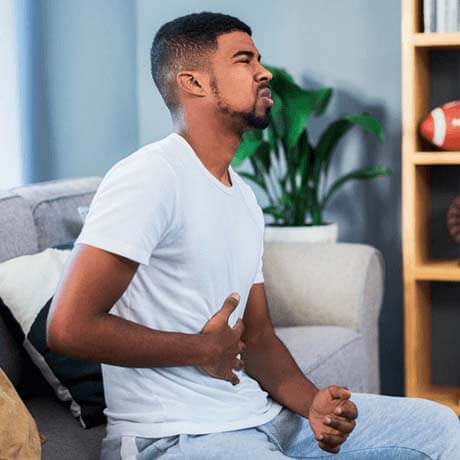Abdominal Pain / Gas Bloat
Abdominal Pain
You have probably experienced some type of abdominal pain at least one point of your life. This can be in the form of a stomachache, gut ache, belly ache, abdominal cramps, or pain in the abdomen.
Abdominal pain can have many characteristics. It can be a dull ache, mild, or severe. Pain can be continuous or periodic (come and go). Also, abdominal pain can have a sudden onset (acute) or develop over the course of weeks, months, or even years (chronic). The pain can be sharp and in one area (localized), or it could be colicky (severe pain that travels like waves from one point to another).

While some mild aches may not be alarming, it is possible that your abdominal pain is due to an underlying disease.
Acute or rapidly developing abdominal pain may have several causes, including appendicitis, cholecystitis, cholangitis, peptic ulcer disease, GERD (gastroesophageal reflux disease), pancreatitis, peritonitis, IBS, or gastroenteritis (bacterial or viral).
On the other hand, if you are experiencing long-term or chronic (for weeks, months, or even years) abdominal pain, it may be due to celiac disease, functional dyspepsia, gallstones, liver infections like hepatitis, gastritis (inflammation of the stomach), peptic ulcer disease, h-pylori infection, abdominal hernia, irritable bowel syndrome, inflammatory bowel disease, colitis (inflammation of the colon), or parasitic infections.
You should seek immediate medical care if you are experiencing severe abdominal pain, especially if it is accompanied by fever, nausea, and/or vomiting. You should also get a consultation if you see blood in your stool, are having persistent unwanted weight loss, jaundice, etc.
Gas & Bloating
While bloating or abdominal pain can make you uncomfortable, it can also make you feel embarrassed in certain situations. Feeling bloated, which refers to having a full stomach and passing excessive gas (flatus) is a common condition. Let’s go through some details about gas and abdominal bloating and what causes it.
Gas (flatus) is a natural and common phenomenon. However, having to pass too much gas or bloating can cause disturbances in your everyday life. In most cases, bloating due to gas isn’t because of a serious problem or disease. It might be just because of stress or your diet.
Some of the common symptoms of gas bloat are feeling full even without eating, heartburn, excessive burping, excessive flatus, abdominal pain or discomfort, and nausea or vomiting. It can also be accompanied by diarrhea or constipation.
Gas and bloating is usually due to some residual food particles in the intestine, which are the cause of the production of various gases. The residual food is acted upon by the gut bacteria, which produce gases like CO2 after consuming food. Also, the leftover food pulls water out of the intestinal cells into the lumen, which can cause diarrhea. This buildup of fluid and gas can make you feel pain and become bloated.
Another possible cause might be a change in the number of bacteria, which can cause more than usual production of gas, leading to flatulence. Moreover, lactose intolerance or poor carbohydrate metabolism, constipation, low fiber diet, high protein diet, and other digestive disorders, like infection, can possibly cause gas and bloating.
Excessive flatus or gas bloating often resolves on its own or with the use of over-the-counter medicines. However, you should call your doctor if you experience the following symptoms that tend to not go away, such as persistent diarrhea or constipation, constant abdominal pain, weight loss, excessive nausea or vomiting, or a continuous urge to pass gas that may make you uncomfortable at different times, chest pain, and loss of appetite.
If you’re tired of being in pain and want an effective solution for your problems, call us today at (718) 291-0488 or book your appointment, and come down to our private clinic in Jamaica Estates to see Dr. Gupta.
